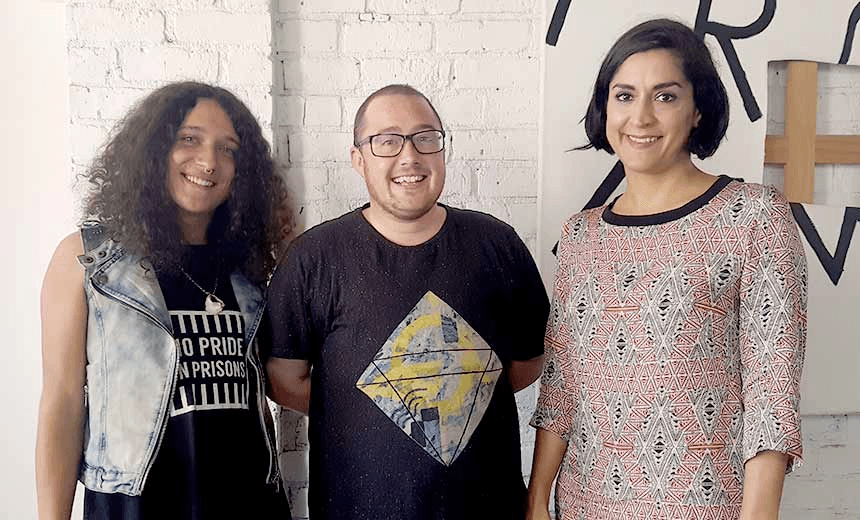In this special one-off podcast marking the Auckland Pride Festival and brought to you by AUT, Sam Orchard talks to Emmy Rākete and Dr Pani Farvid about gender noncomformity, trans rights and challenging queer/straight binaries in Aotearoa and beyond.
Today’s panelists are Sam Orchard, trans man, comic book artist, designer and activist; Emmy Rākete, Māori trans woman and No Pride in Prisons activist; and Dr Pani Farvid, cis gender woman and AUT social psychologist and gender researcher. Watch Dr Farvid’s recent TEDx Auckland talk ‘Saying goodbye to gender binary’ here and read an excerpt from the panelists’ conversation below.
To listen this podcast you can download it directly (right click to save) or stream it direct below.
Pani Farvid: I think that if you’re really attached to this notion that gender is inherent, eternal and essential, like something you’re born with, all you have to do is look at the expression of gender throughout history to see that it’s occupied so many diverse positions and whenever it’s taken that more… the way we see gender today – very heteronormative etc – it’s because we’ve been in a patriarchal context. It’s needed the binary of the masculine and the feminine, which are seen as having different attributes which are complementary but opposite, and one’s better, and one’s not as good. And that’s been the problem.
And a lot of the silencing or suppressing or the not paying attention to historical manifestations of gender diversity, transgenderism and so on: there’s a really fascinating history of [gender diversity] within Iran, or as it was, Persia, which a woman historian at Harvard has looked at, the different ways that transgenderism has manifested. And I can tell you right now that contemporary Iran would not want to be talking about that!
Emmy Rākete: It’s a very similar situation in the Pacific obviously. Fa’afafine people from Samoa are probably one of the more well known examples of how gender as it’s understood in the West has a specific historic context to it which doesn’t apply universally. But there’s the same history in Aotearoa, just far more obscured. It’s been interesting to discover how that obscuring happened here, looking at how Māori culture was undertood by colonisers as opposed to Samoan culture. And then seeing how that history was rediscovered, first of all by Māori academics in the ’80s and then fostered. So at the moment my job is health research about queer Māori healthcare outcomes and – I think this is a huge success for queer Māori in particular – we have health equity with Pākehā for HIV/Aids outcomes, which is amazing because there is pretty much no other health metric where Māori have equity with Pākehā. And I think the very deliberate fostering of takatāpui – which is the Māori word for queer and trans people – and of takatāpui collectives, basically as soon as we found out about this history of queer and trans Māori experiences pre-colonially, has been a really important protective factor for takatāpui. I think that’s really neat.
Sam Orchard: And that work that’s been done hasn’t occurred through Pākehā opening doors, right? It actually met with quite a lot of resistance and was fought for with quite a lot of energy and work.
Emmy Rākete: Yeah, so the term takatāpui was first brought into mainstream consciousness – again, after it was suppressed during colonisation – in the ’80s by a Māori academic called Ngahuia Te Awekotuku and that was a really important thing for us, because before that time the only way we had of understanding ourselves was through a Pākehā cultural lens of what it meant to be a non-hetereosexual person. But of course there has always been non-hetereosexual Māori but I think for me, as a young non-hetereosexual Māori myself, it was really important just seeing old carvings of dudes sucking dick and stuff, and [realising] “Oh, we’ve always been doing some good gay shit.” It was really important, because one of the things that happened during colonialisation was the crushing of the knowledge that we did do that kind of stuff. And it was a political acheivement to bring that knowledge back, because it very well could not have. If Ngahuia hadn’t looked at the untranslated manuscript of the story of Hinemoa and Tutanekai, she never would have found this specific word describing the relationship between Tutanekai and his lover, Tiki, and we never would have known about this whole history. It was one word in one manuscript that let us rediscover all this really really important stuff about ourselves and our society.
